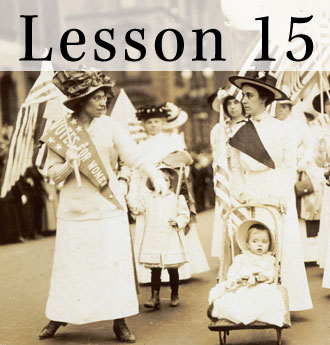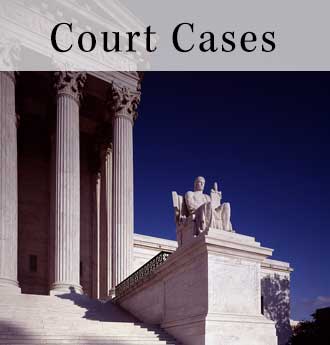Lesson 15: How Have Amendments and Judicial Review Changed the Constitution?
The case summaries below were provided by Oyez and licensed under the Creative Commons Attribution-NonCommercial 4.0 International License. Please visit Oyez.org for more case summaries.
Chisholm v. Georgia (1793)
Facts of the case:
In 1777, the Executive Council of Georgia authorized the purchase of supplies from South Carolina businessman Robert Farquhar. After receiving the supplies, Georgia did not deliver payments as promised. After the Farquhar's death, the executor of his estate, Alexander Chisholm, took the case to federal court in an attempt to collect from the state. Georgia maintained that it was a sovereign state not subject to the authority of the federal courts.
Case Question:
Was the state of Georgia subject to the jurisdiction of the Supreme Court and the federal government?
Case Conclusion:
Yes. In a 4-to-1 decision, the justices held that "the people of the United States" intended to bind the states by the legislative, executive, and judicial powers of the national government. The Court held that supreme or sovereign power was retained by citizens themselves, not by the "artificial person" of the State of Georgia. The Constitution made clear that controversies between individual states and citizens of other states were under the jurisdiction of federal courts. State conduct was subject to judicial review.
Citation:
The Oyez Project, Chisholm v. Georgia, 2 U.S. 419 (1793)
Link to case: https://www.oyez.org/cases/1789-1850/2us419
Ware v. Hylton (1796)
Facts of the case:
This case involved the Treaty of Paris, which established peace in 1783. A Virginian owed a debt to a British subject. A Virginia law provided for the confiscation of such debts on the ground the the debt was owed to an alien enemy. The British subject (actually, his administrator) sued in a federal court to recover on the bond. The administrator argued that the Treaty of Paris ensured the collection of such debts.
Case Question:
Does the Treaty of Paris override an otherwise valid state law?
Case Conclusion:
Four of the five justices wrote opinions. It was the practice of that time for the Court to issue opinions one after another, and there was no "opinion for the Court." Collectively, the justices held that federal courts had the power to determine the constitutionality of state laws. They invalidated the Virginia law under the supremacy clause and, in the words of a distinguished scholar of the period, "established for all time [the Supreme Court's] power of judicial review of state laws."
Citation:
The Oyez Project, Ware v. Hylton, 3 U.S. 199 (1796)
Link to case: https://www.oyez.org/cases/1789-1850/3us199
Hylton v. United States (1796)
Facts of the case:
In 1794, Congress enacted a law entitled "An act to lay duties upon carriages for the conveyance of persons." The law assessed a tax of sixteen dollars on each carriage owned by an individual or business. Hylton viewed the law as a direct tax in violation of the constitutional requirement that taxes passed by Congress must be apportioned, that is, laid according to the population and the number of representatives from each state.
Case Question:
Did Congress violate the Constitution and go beyond its taxing and spending powers in implementing the tax on carriages?
Case Conclusion:
No. The Court held that the tax was legitimate. In one of the opinions, Justice Chase argued that an apportioned tax on carriages would lead to inequalities in the tax burden between states. Furthermore, he interpreted the terms "tax" and "duty" in Article I, Section 8 broadly, and concluded that the carriage tax was an indirect tax. Justice Iredell argued that to administer an apportioned tax on carriages would be "absurd," for if a state had no carriages it would be impossible to implement the tax. He concluded that if a tax could not be apportioned, then it was not a direct tax "in the sense of the constitution."
Citation:
The Oyez Project, Hylton v. United States, 3 U.S. 171 (1796)
Link to case: https://www.oyez.org/cases/1789-1850/3us171
Marbury v. Madison (1803)
Facts of the case:
The case began on March 2, 1801, when an obscure Federalist, William Marbury, was designated as a justice of the peace in the District of Columbia. Marbury and several others were appointed to government posts created by Congress in the last days of John Adams's presidency, but these last-minute appointments were never fully finalized. The disgruntled appointees invoked an act of Congress and sued for their jobs in the Supreme Court.
Case Question:
Is Marbury entitled to his appointment? Is his lawsuit the correct way to get it? And, is the Supreme Court the place for Marbury to get the relief he requests?
Case Conclusion:
Yes. Yes. It depends. The justices held, through Marshall's forceful argument, that on the last issue the Constitution was "the fundamental and paramount law of the nation" and that "an act of the legislature repugnant to the constitution is void." In other words, when the Constitution--the nation's highest law--conflicts with an act of the legislature, that act is invalid. This case establishes the Supreme Court's power of judicial review.
Citation:
The Oyez Project, Marbury v. Madison, 5 U.S. 137 (1803)
Link to case: http://oyez.org/cases/1792-1850/1803/1803_0
Pollock v. Farmers Loan and Trust Company (1895)
Facts of the case:
The Constitution gave the states the power to impose direct taxation. The federal government could impose direct taxes as well, but only if those taxes were apportioned among the states in proportion to their representation in Congress. In this case the Court examined a national income tax passed by Congress in 1894. This case was decided together with Hyde v. Continental Trust Company of the City of New York.
Case Question:
Was the income tax a direct tax in violation of Article I, Section 9 of the Constitution?
Case Conclusion:
Yes. The Court held that the act violated the Constitution since it imposed taxes on personal income derived from real estate investments and personal property such as stocks and bonds; this was a direct taxation scheme, not apportioned properly among the states. The decision was negated by the adoption of the Sixteenth Amendment in 1913.
Citation:
The Oyez Project, Pollock v. Farmers' Loan & Trust Co., 157 U.S. 429 (1895)
Link to case: https://www.oyez.org/cases/1850-1900/157us429








